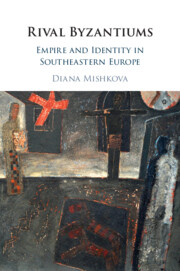Book contents
- Rival Byzantiums
- Rival Byzantiums
- Copyright page
- Contents
- Acknowledgements
- Note on the Text
- Additional material
- Introduction
- Part I On the Road to the Grand Narrative
- Chapter 1 Precursors
- Chapter 2 The Century of History
- Chapter 3 In Search of the ‘Scientific Method’
- Chapter 4 Between Byzantine Studies and Metahistory
- Chapter 5 Byzantium in Ottoman and Early Republican Turkish Historiography
- Part II Metamorphoses of Byzantium after World War II
- References
- Index
Chapter 2 - The Century of History
Byzantium in the Budding National-Historical Canons
from Part I - On the Road to the Grand Narrative
Published online by Cambridge University Press: 01 December 2022
- Rival Byzantiums
- Rival Byzantiums
- Copyright page
- Contents
- Acknowledgements
- Note on the Text
- Additional material
- Introduction
- Part I On the Road to the Grand Narrative
- Chapter 1 Precursors
- Chapter 2 The Century of History
- Chapter 3 In Search of the ‘Scientific Method’
- Chapter 4 Between Byzantine Studies and Metahistory
- Chapter 5 Byzantium in Ottoman and Early Republican Turkish Historiography
- Part II Metamorphoses of Byzantium after World War II
- References
- Index
Summary
The chapter outlines the impact of romantic philhellenic and Slavophile thought on the emerging grand narratives in southeastern Europe. Its focus is the formative phase in the national historiographical canons of Greece, Bulgaria, Serbia and Romania during the nineteenth century and the interpretations of Byzantium intrinsic to these narratives. The Greek historiography devoured the empire and its cultural heritage wholesale, turning it into an integral part of national continuity and assimilating the canonical (and teleological) European division of history into classical, medieval and modern periods. For the Bulgarians, Byzantium, which they equated with contemporary Greeks, featured as the main adversary in confrontation with whom the Bulgarian national state and identity crystallised and were sustained. The Serbian historians foregrounded the significance of the medieval empire of Stefan Dušan as an actual heir and improved version of the Eastern Roman empire. Romania, the latecomer on the medieval political scene, reconfirmed its claims to represent the Latin West in the (post-)Byzantine East.
Keywords
- Type
- Chapter
- Information
- Rival ByzantiumsEmpire and Identity in Southeastern Europe, pp. 35 - 75Publisher: Cambridge University PressPrint publication year: 2022

